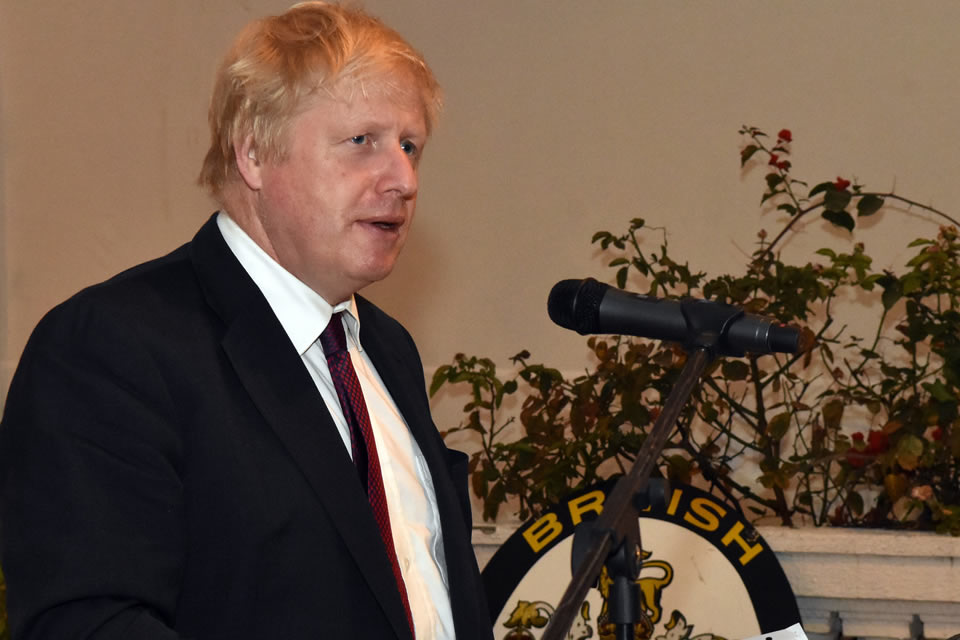We have neglected Latin America's realms of gold for too long - Brexit can change that: article by Boris Johnson
The Foreign Secretary writes in the Telegraph about his recent trip to Latin America, and the unique opportunities the region presents for the UK.

Much have I travelled in the realms of gold, and many goodly states and kingdoms seen – 67, to be exact, since I have been Foreign Secretary. But never have I felt such a sense of mystery as I did last week when I gazed at the Pacific from the coast of Latin America – and we looked at each other, as the poet puts it, with a wild surmise.
The mystery was what had taken us so long. Why was I the first Foreign Secretary to visit Peru for 50 years? How had we waited 25 years to go to Argentina, and the same in the case of Chile? Was it the idleness of my illustrious predecessors? Could you honestly say that they were lazy? Howe, Hurd, Hague, Hammond? Hardly.
Could they have been ignorant of the intricate historical and cultural links between Britain and Latin America? In Argentina there is not only a sizeable Anglophone population, but we built the railways and the Paddington-style terminus in Buenos Aires. When I arrived at the UK embassy I was piped to my room by local members of the Scots Guards appreciation society.
In Chile – as everyone reminded me – this is the 200th year of its liberation from the Spanish, achieved largely thanks to the nautical wizardry of Admiral Thomas Cochrane, a British MP.
As for Peru, we spent a day flying deep into the Amazon with President Martin Vizcarra, and it would have made you very proud to see how British solar battery technology is helping to power the laptops of some of the poorest kids in Latin America.
Did you know – I bet you did not – that thanks to mining interests the UK is the second biggest global investor in Peru? The very boundaries of Peru were once mapped by Col PH Fawcett (identified by my mother as a distant relative), who later disappeared, presumed eaten.
In spite of this difficult experience, the people of the region retain, as one of our excellent ambassadors put it, a keen and growing appetite for all things British. They want to see more investment, more engagement, more co-operation, on everything from culture to cybercrime. So why – to return to the mystery with which I began – have we been so apparently stand-offish?
Here is my surmise. Think back to 1966, when Labour foreign secretary Michael Stewart was the last of my predecessors to visit Peru. It was only a few years later that Britain began negotiations to join what was then called the Common Market … you know what is coming next. You could argue that over the succeeding decades we became more Eurocentric and less instinctively global than we had been; and we simply lost focus on Latin America.
Today, that vast continent – full of countries and peoples whose values are so close to our own – makes up a pitiful share of our trade. In exports we are thrashed by other Europeans – France, Germany and Spain. Chile is full of Anglophiles; I was amazed how often I was asked to sign dog-eared books. But the UK makes up only 0.8% of Chilean imports.
Now is our moment not to be less European – we can do a great free trade deal with the EU that will benefit both sides – but to be truly global again. Now is the time to create deals with these dynamic countries (Chile alone has 24 such deals with 64 nations comprising 85% of global GDP). But our Latin American partners are emphatic: if this is to work, we must come fully out of the EU customs union.
Here, in particular, there is a lesson from Latin America. The continent is divided between Mercosur, a customs union comprising Brazil, Argentina, Uruguay and Paraguay, and the Pacific Alliance, a free-trading, free-market grouping of countries – Mexico, Colombia, Peru, Chile – that operate their own trade policies.
I will not enter into South American controversy except to say that I heard plenty of grumbles against the one-size-fits-all tariffs of Mercosur (Argentina, for instance, resents punitive tariffs against French champagne designed to protect a prospective Brazilian champagne industry); and there is absolute unanimity that if we are to be a valid trading partner, then we must take back control – as the PM has said – of our tariff schedules, and do deals that are unhindered and uncomplicated.
If we get it right, the opportunities are vast. Already UK bus companies are bidding to supply London double deckers to the streets of Santiago. Thanks to the success of the London 2012 Olympics the UK is helping Lima to lay on the Pan-American games. The legendary potations of the British – who like a 14% Malbec – mean we are already the second biggest drinkers of Argentine wine. And that is before we have done the free trade deal.
For Latin America and for Britain there are realms of gold on either side of the Atlantic. All we need now is to rediscover that global spirit.
Find out more about the Foreign Secretary’s visit to Peru, Argentina and Chile.